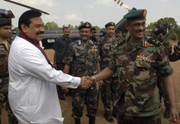President Mahinda Rajapaksa has approved the early release of Sri Lanka’s jailed former army chief in a move designed to quieten criticism of his nation’s human rights record. General Sarath Fonseka, 61, led Sri Lanka’s armed forces towards the end of his nation’s civil war, but was sentenced to 30 months in prison in 2010 on charges of corruption, and subsequently to three further years in 2011.
Before his imprisonment Gen Fonseka unsuccessfully challenged Mr Rajapaksa during Sri Lanka’s 2010 presidential election, a factor some analysts believe contributed to his incarceration, an allegation denied by the government. He should now be released on Monday.
The move comes almost exactly three years after the end of the civil war, with Sri Lankan “Victory Day” on Saturday marked by a military parade in the capital Colombo to commemorate the final defeat of Tamil Tiger separatists in 2009.
It also comes at a time in which Mr Rajapaksa’s government is coming under growing international pressure for alleged war crimes committed during the conflict, most recently during talks in Washington on Friday between Hillary Clinton, US secretary of state, and Sri Lanka’s foreign minister.
“If these are credible steps then we would welcome them,” said Meenakshi Ganguly, south Asia director for Human Rights Watch. “But if it turns out that yet again this is an attempt to deflect attention until the international community moves on to some other issue, we will have to keep up the pressure.”
“We remain concerned about the intentions of the Sri Lankan government, but we would love to be pleasantly surprised,” she said, while adding that it was not clear that Gen Fonseka would be allowed to take part in political activities following his release.
In March the US sponsored a resolution at the UN Human Rights Council demanding the investigation of alleged war crimes committed during the closing stages of the civil war, which lasted for more than two decades.
Mr Rajapaksa also faces criticism for his administration’s increasingly autocratic style, including a tight knit leadership dominated by the president and his immediate family, notably his brothers, Basil and Gotabaya, who control the economic and defence portfolios.
Sri Lanka has grown strongly since the end of the civil war, with an 8 per cent expansion in gross domestic product last year, raising hopes of a sustained “peace dividend”.
More recently, however, the economy has come under pressure following a devaluation in the rupee late last year, a move designed to stem the outflow of foreign reserves by reducing imports, but which has also contributed to inflation.
Public protests hit the country in February following government moves to increase fuel prices on the back of rising oil costs, while the country has also been criticised for its extensive reliance on imported Iranian crude.
By James Crabtree in Mumbai
FT
